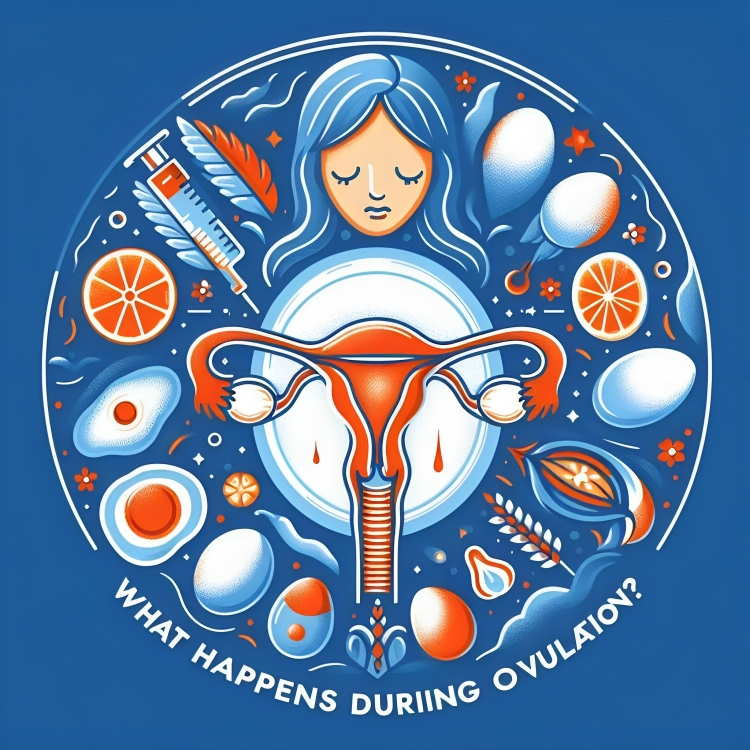Understanding Ovulation: A Key to Fertility

Ovulation is a pivotal process in the menstrual cycle, crucial for fertility and conception. Understanding what happens during ovulation can empower individuals and couples in their journey towards conception.
This article delves into the intricacies of ovulation, its signs, and its impact on fertility, providing insights and guidance to those navigating the path to parenthood.
Key Takeaways Table:
|
Key Point |
Description |
|
Definition of Ovulation |
Explaining what ovulation is and its importance in fertility |
|
Ovulation Process |
Detailed steps of what happens during ovulation |
|
Signs and Symptoms |
Identifying physical signs and symptoms of ovulation |
|
Ovulation and Fertility |
How ovulation impacts fertility and conception chances |
|
Tracking Ovulation |
Methods and tools for tracking ovulation |
The Ovulation Process: A Step-by-Step Guide
Ovulation marks the release of a mature egg from one of the ovaries. This process is the cornerstone of fertility and is essential for conception.
Here's a step-by-step breakdown of what happens:
- Follicular Phase: The cycle begins with the follicular phase, where the pituitary gland releases follicle-stimulating hormone (FSH). This hormone stimulates the growth of ovarian follicles, each containing an immature egg.
- Rise in Estrogen: As follicles develop, they produce estrogen. High levels of estrogen signal the body that a follicle is ready to release an egg.
- Luteinizing Hormone (LH) Surge: The peak in estrogen triggers a surge in luteinizing hormone, which is crucial for ovulation. This LH surge causes the dominant follicle to release its egg.
- Egg Release: The mature egg is released into the fallopian tube, marking the actual moment of ovulation.
- Luteal Phase: After ovulation, the ruptured follicle transforms into the corpus luteum, which secretes progesterone. This hormone prepares the uterine lining for potential implantation of a fertilized egg.
Recognizing the Signs of Ovulation:
Identifying ovulation signs can be key in timing intercourse for conception. Common symptoms include:
- Changes in Cervical Mucus: Around ovulation, cervical mucus becomes clear and stretchy, resembling egg whites.
- Basal Body Temperature Shift: After ovulation, there's a slight increase in basal body temperature, detectable with a thermometer.
- Mittelschmerz: Some women experience a mild, one-sided abdominal pain known as mittelschmerz during ovulation.
Impact of Ovulation on Fertility:
Ovulation is a crucial determinant of fertility. The released egg is viable for about 24 hours, while sperm can survive in the female reproductive tract for up to five days.
Understanding this window of fertility can significantly enhance the chances of conception.
Tracking Your Ovulation:
Tracking ovulation can be done through various methods:
- Ovulation Predictor Kits: These detect the LH surge, indicating imminent ovulation.
- Fertility Monitors: Advanced devices that track multiple fertility hormones.
- Calendar Method: Tracking menstrual cycles to predict ovulation based on the average cycle length.
Understanding ovulation is critical for anyone trying to conceive, as it provides insight into the most fertile days of the menstrual cycle.
While tracking ovulation is crucial, it's also important to support overall reproductive health.
One way to do this is through supplements like myo inositol, which you can learn more about in our detailed guide: What does myo inositol do?.
The Role of Hormones in Ovulation:

Ovulation is intricately tied to the balance of hormones within the body. The interplay of estrogen, progesterone, follicle-stimulating hormone (FSH), and luteinizing hormone (LH) orchestrates the ovulation process.
Here's how these hormones contribute:
- Estrogen: Builds up the uterine lining and triggers the LH surge.
- Progesterone: Stabilizes the uterine lining post-ovulation, preparing it for a potential pregnancy.
- FSH: Stimulates follicle growth in the ovaries.
- LH: Triggers ovulation and the formation of the corpus luteum.
Understanding these hormonal changes can help in identifying the ovulation period more accurately.
Ovulation Disorders and Fertility Challenges:
Several conditions can disrupt the ovulation process, impacting fertility. Conditions such as Polycystic Ovary Syndrome (PCOS), thyroid disorders, and high prolactin levels can lead to irregular or absent ovulation.
Addressing these underlying conditions is crucial for restoring ovulatory function and enhancing fertility.
Lifestyle Factors Influencing Ovulation:
Lifestyle choices play a significant role in ovulation and overall fertility. Factors such as diet, exercise, stress, and body weight can influence hormonal balance and ovulation regularity.
Adopting a healthy lifestyle, including a balanced diet and regular exercise, can promote regular ovulation and improve fertility.
Advanced Ovulation Tracking Techniques:
For those struggling with fertility issues or irregular cycles, advanced ovulation tracking techniques can be beneficial. These include:
- Transvaginal Ultrasound: Monitors follicle development in the ovaries.
- Blood Tests: Check hormone levels to confirm ovulation.
- Fertility Apps: Use algorithms to predict ovulation based on cycle data.
Graphical Representation:

Conclusion:
Understanding what happens during ovulation is crucial for anyone on a fertility journey. By recognizing the signs of ovulation, tracking it effectively, and addressing any underlying fertility issues, you can increase your chances of conception.
Additionally, supporting your reproductive health with the right supplements, like myo inositol, can further enhance your fertility.
Reference List:
- "The Role of Estrogen in Ovulation" - Link to study on estrogen's role in triggering the LH surge
- "Impact of Progesterone in Women's Health" - Link to research on progesterone's role post-ovulation
- "Follicle-Stimulating Hormone and Its Functions" - Link to study on FSH in follicle growth
- "Luteinizing Hormone: The Trigger for Ovulation" - Comprehensive study on LH's role in ovulation
- "Polycystic Ovary Syndrome (PCOS) and Fertility" - Link to research on PCOS and ovulation
- "Effects of Thyroid Disorders on Reproductive Health" - Study on thyroid disorders affecting ovulation
